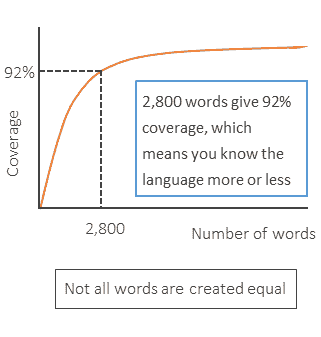This post contains statistics on usage of English language.
1. How many people speak English?
Spoken by 1,453 million (native + non-native), English is the most-spoken language in the world by number of speakers.
Note: Non-native speakers of a language speak the language as their second language (L2). (I hope that’s not confusing.) If you come across a number significantly higher than 1,453 million, then it most likely includes L3 as well.
Here is a comparison of most-spoken (native + non-native) languages:
| Language | Speakers (in millions) |
|---|---|
| English | 1,453 |
| Mandarin Chinese | 1,118 |
| Hindi | 602 |
| Spanish | 548 |
| French | 274 |
| Standard Arabic | 274 |
| Bengali | 272 |
| Russian | 258 |
| Portuguese | 258 |
| Urdu | 231 |
Source: Ethnologue, 25th edition (released in Feb 2022). Ethnologue, in their own words, is an authoritative resource on world languages, trusted by academics and Fortune 500 companies alike.
2. How many people speak English natively?
Of 1,453 million speakers of English, 373 million are native speakers (those who speak English as their first language) and 1,080 million are non-native speakers (those who speak English as their second language).
Spoken by 373 million natives, English is third-most-spoken native language in the world by number of speakers. Here is a comparison of most-spoken native languages:
| Language | Speakers (in millions) |
|---|---|
| Mandarin Chinese | 920 |
| Spanish | 475 |
| English | 373 |
| Hindi | 344 |
Source: Ethnologue, 25th edition (released in Feb 2022)
3. Countries with most native speakers of English
| Country | Speakers (in millions) |
|---|---|
| United States | 257 |
| United Kingdom | 56 |
| Canada | 19.5 |
| Australia | 17 |
| South Africa | 5.6 |
| Ireland | 4.5 |
| New Zealand | 3.8 |
Source: Ethnologue (English language), 25th edition (released in Feb 2022)
4. Countries with most non-native speakers of English
Note that this isn’t a reflection on quality of English they speak. There is a separate ranking for that, but it measures ‘English proficiency’ through online test, which would hardly be able to measure someone’s speaking prowess.
| Country | Speakers (in millions) |
|---|---|
| India | 265 |
| Pakistan | 104 |
| Nigeria | 60 |
| Philippines | 52 |
| United States | 49 |
| Germany | 46.6 |
| Egypt | 35 |
| Uganda | 29 |
| France | 26.2 |
| Italy | 20.7 |
Source: Ethnologue (English language), 25th edition (released in Feb 2022)
5. What % of English conversations involve only native speakers?
If we listen to every conversation happening in the world, only 4 percent of the conversations involve only native speakers. Rest involve at least one non-native speaker.
6. English is ‘the’ language on internet
English is the dominant language on internet. Nearly 58 percent of content on the internet is in English. Russian, at around 5 percent, is a distant second. (The data pertains to 10 million websites with most traffic.) Here is the top-10 list:
| Language | % of content |
|---|---|
| English | 57.7 |
| Russian | 5.3 |
| Spanish | 4.5 |
| French | 3.9 |
| German | 3.9 |
| Japanese | 3.2 |
| Turkish | 2.6 |
| Persian | 2.2 |
| Portuguese | 1.8 |
| Italian | 1.7 |
Source: Historical trends in the usage of content languages for websites, W3Techs (as on 01 January 2023)
7. English is the language of technical and scientific periodicals
More than 50 percent of world’s technical and scientific periodicals are in English.
Participate in a short survey
If you’re a learner or teacher of English language, you can help improve website’s content for the visitors through a short survey.
8. English can have outsized impact in some countries
In countries where English is not the first language for most people but where work is regularly transacted in English, English can have an outsized influence.
In India, which fits the bill for such country, English (# 44) is light years behind Hindi (#1) as the first language of people. However, it is second only to Hindi when it comes to second language speakers, and it leads among third language speakers. Overall (combining the first, second, and third language speakers), it is the second-most-spoken language in the country.
Source: mint
9. Stats on vocabulary
9.1 Number of words in English Language
Putting a number to words in English language is not easy because, first of all, it’s not even clear what constitutes a word.
Should ‘air’ be counted twice – once as noun (example: the air is polluted) and once as verb (example: he finally decided to air his opinion)? Should medical and scientific terms be treated as words? Should names of countries be treated as words? Should obsolete words be included? And so on.
There are many questions on what constitutes a word, most with differing answers. And therefore, depending on the source you’re referring to, you’ll find multiple word counts in English language.
As per Oxford Dictionary, there are:
- 171,476 words in current use
- 250,000 distinct words, excluding inflections and words from technical and regional vocabulary
- 750,000 words if words are counted in the most liberal way
Source: Oxford Dictionary
9.2 Vocabulary of native & non-native speakers
Native speakers
Native speakers who grew up in an English-speaking country and went to college typically have a vocabulary size of 25-30,000 words.
(The above range is a rough, commonly-accepted estimate. In reality, estimates vary widely. This source, for example, estimates that a 20-year-old native speaker of American English knows 42,000 lemmas (or dictionary words), and this knowledge can be as superficial as knowing that the word exists. This estimate, however, puts the vocabulary size of a college student to 16,785 words.)
Note that even native speakers have a command over just 4 percent of words in English language. (We’ll see later in the post that this small fraction covers almost all words used in spoken and written English.)
Vocabulary of students in third grade: 4-24,000 words, with the median of around 10,000 words. Source: Nagy & Herman, 1987
Non-native speakers
In contrast, non-native speakers typically have a vocabulary of 2-3,000 words. Source
Here is a pictorial comparison of vocabulary of native and non-native speakers:
Note: Feel free to use the above and other images in the post, using the link of this post for reference/attribution.
9.3 Proportion of nouns, adjectives, verbs, etc. among English words

Source: Oxford Dictionary
9.4 Not all words are created equal
Native speakers cover almost all words used in common parlance in spoken and written English. However, you don’t need to attain their level of vocabulary to reach a high coverage of words in common English.
Dr. Brent Culligan, Joseph Phillips, and Dr. Charles Browne analyzed a corpus of 273 million words of spoken and written British and American English to come up with their New General Service List (NGSL) of 2,800 words. These words cover a whopping 92 percent of words people are likely to come across in average newspaper, magazine, TV show, book, movie, and so on. 92 percent coverage with only 2,800 words (around 10 percent of a native speaker’s vocabulary)! Recall Pareto (or 80-20) principle.




There is probably an error in the use of the word alphabet. An alphabet is series of written letters (mostly recited in a fix order) … There is the Latin, the Greek, the Arabic, the Hebrew and the Cyrillic alphabet.
Yes, there was. Thanks for pointing out.
Nice stats but expected approximate number of speakers who speak and write grammatically correct english.but you have given nice information and worth appreciation.thanks
This is something new that i learn today on literature and people who have spend their life. Thanks for sharing this information which is valuable. subscribed your blog.
Interesting statistics but fails to mention impact of others being in the English language who are not of English origin. The English American population decreased -26.4m since 1980 we are an island language, culture, genetic history. It doesn’t mention how they learned English, looking at NY/MA/Other US college and university English Departments about 80% of people teaching English since the 1950’s arn’t English, check the numbers though. Or why people are in it and why they learned it. Is there an English speaker registration card? Has anyone not English signed a code of ethics to be in a language not their own?